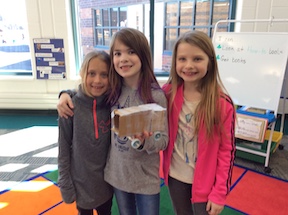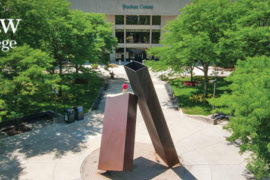Using recycled paper towel rolls, cardboard, plastic cups, coffee filters and a wide variety of other materials, Beacon Elementary students are exploring their creative side while utilizing problem solving skills in a newly-launched Maker Club program. Media Specialist Evie Erickson guides small groups of 2nd graders through a 6-week program in which they work on a series of different projects, some with constraints to be met and others with complete freedom to create.
Introduced this past fall as a pilot program, the Beacon Maker Club began with an initial class of 12 students who were given the choice to give up a recess period for six weeks in order to participate. Over time the program gained popularity, due in part to the final step of each project’s process – participants must share their creations with others. Subsequently, more and more students wanted to join the class, and the program is now capped at 24 students in each session and has expanded to a 50-minute class period.
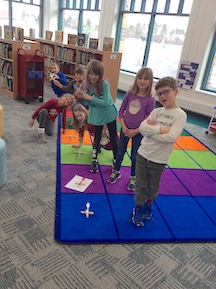
Supplies for the Maker Club are recycled materials Erickson brings from home or that she finds in recycling bins around the school. Beacon teachers also contribute extra classroom items to the materials cart, and students are welcome to bring in special materials from home for their project designs. Groups can also utilize the Media Center’s littleBits™ modular electronics kits to incorporate lights, sensors and motors into their designs.
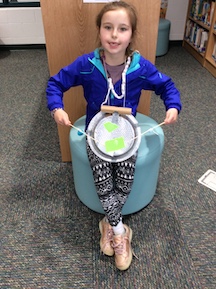
“The Maker Club is completely student-driven,” says Erickson. For each project, she presents the objective to be completed, including any constraints, and the student groups are then given free rein to plan and design their creations. On the wall in the Media Center is a problem-solving checklist students are encouraged to use in their project development – ask, imagine, create, test, improve and share. Erickson provides guidance when needed, but gives the students freedom to fail in order to experience the trial and error process.
For one project, students were asked to design and build a catapult. During each project’s design phase, Erickson requires the group to first create a plan for the construction of their project. From that initial plan, groups built their catapults using any materials they chose, then tested their design to see how far they could launch an item.
Once they had an initial measurement, Erickson asked the team to go back and make improvements in order to beat their first launch. This particular project happened to coincide with the 2nd grade classes learning about metric measuring, and Erickson reiterated that lesson by only allowing groups to measure their launches using centimeters.
Later in the session, students were given the challenge to build a vehicle powered by their own air. Erickson was impressed when a group, completely on their own, figured out how to use a skewer as an axel and plastic water bottle caps for wheels. Another group made their vehicle from small pieces of cardboard. For some of the students, Maker Club is their first experience using real tools.
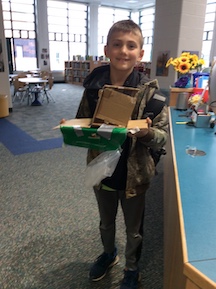
The final project was an opportunity for students to work individually on a design of their own creation. Two students collaborated to design and build a working pontoon boat, with inflated plastic bags serving as the pontoons. The students used components of the littleBits™ kit to fashion a fan as a propulsion mechanism. The boat was tested in a tub of water and successfully floated, propelled by fan power.
An important lesson learned by Maker Club students is how oftentimes a plan can change during the creation process. One student’s free choice project was to make pipe cleaner flowers, but as she moved forward her ideas changed, resulting in her final creation being a drum made from two aluminum pie plates glued together with a marble inside for resonance. The drum included a neck strap to allow for movement while playing and a storage compartment for the sticks.
Erickson encourages Maker Club students to imagine and explore during their project development, and as long as the constraints of the project are met, all ideas along the creation journey are welcome.

